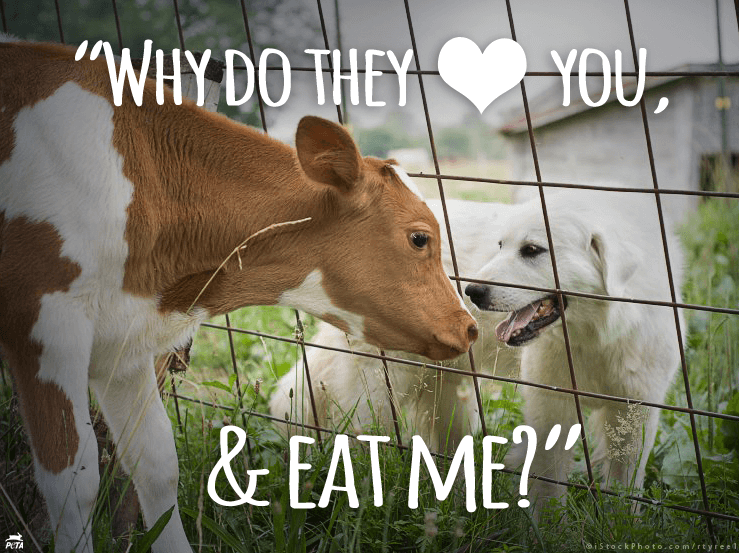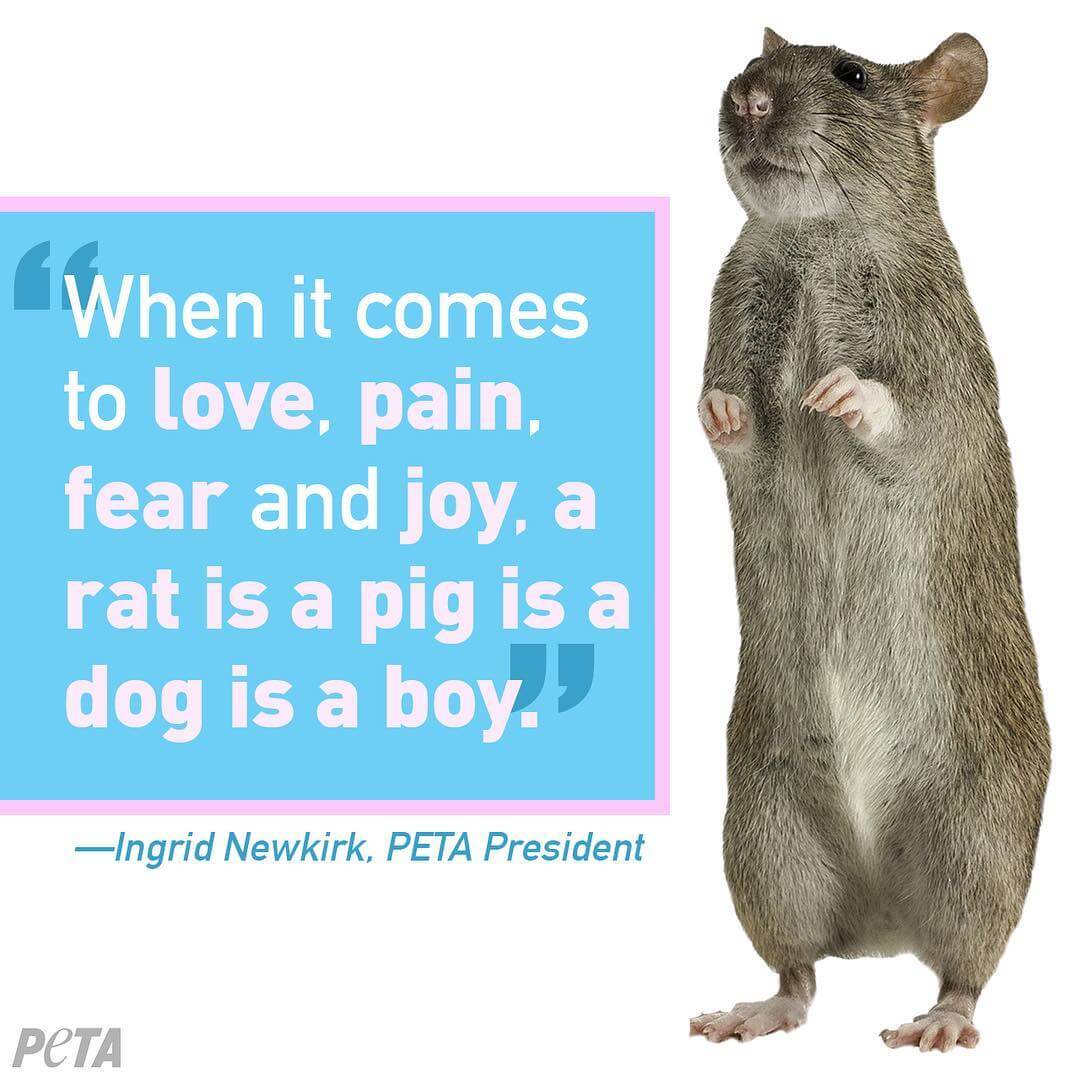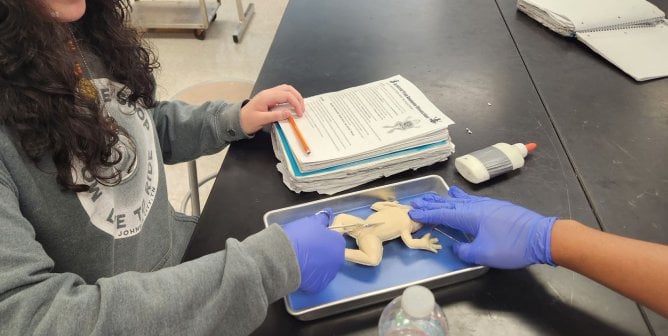Debate Kit: Is Speciesism Unethical?
A hot topic in classrooms and on the minds of many people today is whether or not animals should have rights. Here at PETA, our core belief is that animals are not ours to use. We know that many schools assign debates on topical issues to help their students learn to speak and write persuasively, develop research skills, and recognize multiple sides of a controversial or multifaceted issue—and the ethical question of whether animals should have rights (and if speciesism is unethical) is certainly one such topic. This student debate kit lists a variety of resources that can be shared with students to support the argument that speciesism is ethically unjustifiable and that equal considerations to animals is the only solution.
Resolved: All animals deserve rights and equal consideration, and speciesism is an unjustifiable bias.

AFFIRMATIVE ARGUMENT
As is the case with other major social movements, such as the fights for civil rights, women’s rights, and LGBTQ+ rights, the animal rights movement is fundamentally about ending the systemic exploitation, discrimination, and oppression of others based on their characteristics. In the case of animal rights, such treatment is based on species. At the core of this movement is an attempt to stop speciesism, which is a bias in favor of humans over other animals (just as one particular set of humans may be biased against another set). Simply put, it’s the misguided belief that one species is more important than another. But all animals deserve equal consideration, regardless of humans’ opinions of them, as other animals can experience pain, suffering, joy, and fear, just as we can.
It’s an indisputable fact that animals have sentience and complex nervous systems. Animals are intelligent and complex—much more so than many people even realize—and scientists are finding more and more evidence of this all the time. But emotional complexities and intellectual capabilities aside, animals can feel pain in the same way that humans can—and just like us, they value their lives and don’t want to suffer. In the ways that matter, we’re the same.
Therefore, there is no moral justification for exploiting animals for human purposes, despite any other differences. Humans do have the unique ability to reason and make compassionate choices. We are capable of choosing between cruelty and kindness, so we should never willfully inflict pain on any sentient being—human or otherwise—and we must acknowledge the rights of animals and end our speciesist behavior. Because humans are capable of making choices based on ethics—such as how to feed, clothe, and entertain ourselves—we have the responsibility of making the most ethical choices possible and must do our best to reduce suffering whenever possible.
In his groundbreaking book Animal Liberation, philosopher Peter Singer defines speciesism as “a prejudice or attitude of bias in favor of the interests of members of one’s own species and against those of members of other species.” But it’s also speciesist to treat one animal’s life as more valuable than another’s. For example, billions of cows, pigs, chickens, turkeys, and other animals are killed for food every single year. They’re forced to live in abysmally filthy, crowded conditions and deprived of everything that’s natural and important to them. They’re then shipped off to the slaughterhouse, where the throats of many are cut while they’re still conscious. Intelligent animals exploited for experiments and for the skins industry endure similar abuse. Meanwhile, dogs and cats are considered part of the family in many homes across America—but animals typically used for food are just as smart, clever, unique, intelligent, and sentient as they are. Companion animals deserve to be treated humanely, of course—that’s part of why there are laws protecting them from harm. But as a result of speciesism, animals used in the testing, food, skins, and entertainment industries don’t receive equal consideration—despite their equal ability to feel pain and suffer.

Rejecting speciesism of any kind means taking an objective look at our personal choices and changing the ones that cause sentient beings to suffer. One of the best ways to start is to vote with our dollars. For example, we can oppose animal testing by buying only products that aren’t tested on animals and donating only to charities that never fund or conduct animal experiments. Leaving animal-derived foods off our plates by going vegan is also fundamental in the fight for animal rights. We can purchase clothes made from non-animal materials and say no to animal skins like leather and fur. And we can pledge not to patronize businesses that exploit animals for entertainment, such as roadside zoos and circuses. When humans start to view other species as fellow sentient beings and individuals—and grant them the equal consideration and the ensuing rights and legal protections that they deserve—we’ll be moving past speciesism.
All sentient beings deserve to be treated with respect and compassion—and to be granted rights based on the equal consideration of their needs. Society has the moral obligation to reject speciesism and act with integrity and consistency toward all living beings, and the first step is to recognize that every animal has the right to live free from human exploitation.
BECOME AN ‘EXPERT’
The following links contain general information about animal rights and the ethics of speciesism and can be used to prepare logical arguments.
- Animals Are Like You, Only Different
- BBC Ethics Guide: Speciesism
- The Case Against Speciesism
- Do Animals Feel Pain?
- Do Animals Have a Right to Life?
- End Speciesism
- If You Care About Social Justice, You Should Fight Speciesism
- The Moral Significance of Animal Suffering
- The Psychology of Speciesism: How We Privilege Certain Animals Over Others
- Speciesism: The Final Frontier
- What Is Speciesism?
- Why Some Animals Are More Equal Than Others

BUILD YOUR CASE
Use the following links on animal welfare to gather evidence and examples to support your position against speciesism.
Research Articles and Investigative Analyses Regarding Animal Pain Response
- All Beings That Feel Pain Deserve Human Rights
- Animals Feel Pain Because Something Hurts
- Do Animals Feel Pain in the Same Way As Humans Do?
- Do Fishes Have Nociceptors?
- Evolution: The Advantage of ‘Maladaptive’ Pain Plasticity
- It’s Official: Fish Feel Pain
- The Scientific Basis for Assessing Suffering in Animals
- The Surprisingly Humanlike Ways Animals Feel Pain
- Yes, Animals Think and Feel. Here’s How We Know.
Research Articles and Investigative Analyses Regarding Animal Rights and Speciesism
- All Too Human? Speciesism, Racism, and Sexism
- Gaps in the Mind
- Meat and Seafood Eaters Are Fickle About Love for Animals
- A Moral Argument for Veganism
- The Moral Standing of Animals: Towards a Psychology of Speciesism
- Where Do Nonhuman Mammals Fit in Our Moral Hierarchy?
- Why Are We Outraged About Eating Dog but Not Bacon?
Eyewitness Investigations Demonstrating Routine Animal Abuse in Various Industries
- Bear Cubs Hit, Chained, and Deprived in the Chinese Circus Industry
- Calves Dragged and Face-Branded for Leather Car Interiors
- Calves Torn From Their Mothers, Sick and Struggling to Breathe
- Dogs and Cats Suffer, Die at Liberty Research
- Ducks Kicked, Slammed Against Walls for Meat and Down
- Dying, Chained, and Sick Dogs Found at Iditarod Champ’s Kennel
- Exposed: Tyson Workers Torturing Birds, Urinating on Slaughter Line
- Goats Beaten for Organic Milk
- Hens Buried and Trapped in Manure on British Columbia Egg Farm
- More Than 600 Animals Dead in 3 Months at PetSmart Supplier
- Patagonia’s ‘Sustainable Wool’ Supplier Exposed: Lambs Skinned Alive, Throats Slit, Tails Cut Off
- Psychological Torture Experiments on Monkeys at NIH Must Stop
Additional Resources on Speciesism and Intersectionality
- Calling Someone a Rat Is No Insult
- The Meat Paradox: How We Can Love Some Animals and Eat Others
- Peter Singer: On Racism, Animal Rights, and Human Rights
- Slaughterhouse Workers
- Speciesism: The Movie May Change Your Worldview
- UN International Panel on Climate Change Says Huge Reduction in Meat-Eating ‘Essential’ to Avoid Climate Breakdown

FINDING SOLUTIONS
Use the following resources to help build a proposal suggesting solutions to issues that could allegedly arise if humans acknowledged speciesism and made ethical choices that wouldn’t hurt animals.
- The Case for Animal Rights
- Compassion for Animals: Being Vegan Is the Next Logical Step
- So, You Wanna Dismantle Speciesism?
- Speciesism in the Laboratory
- These Teens Are Working to End Speciesism, and We’re Here for It

ANTICIPATE COUNTERARGUMENTS AND PREPARE REBUTTALS
Analyze websites that support the exploitation of animals to determine the groups’ reasons for justifying speciesism (given its ethical dilemmas and the immense suffering that it causes animals). Investigate what farmers, researchers, government agencies, and other businesses and corporations gain by perpetuating speciesist views and actions, and think critically about their motivations. Also, examine which other entities benefit from the exploitation of animals and speciesism (e.g., restaurants, clothing companies, etc.). Create a list of typical statements made by parties who believe that speciesism is justified (despite the ethical concerns regarding animal rights and animals’ ability to feel pain). Information included in the links in this debate kit can be useful in responding to counterarguments.
ADDITIONAL RESOURCES
Websites
- Animal Equality
- Antispeciesism
- International Association for the Study of Pain: Definitions and Taxonomy
- Mercy for Animals
Videos
- 5 Secrets Behind PETA’s Overwhelming Success in Dismantling Speciesism
- Eating Animals: Like You, Only Different
- How Bigotry Begins
- Nonviolence Includes Animals
- RZA: We’re Not Different in Any Important Way
- Why Care for One Animal and Harm Another?
Books
- Animal Liberation Now by Peter Singer
- Dominion: The Power of Man, the Suffering of Animals, and the Call to Mercy by Matthew Scully
- Eating Animals by Jonathan Safran Foer
- Some We Love, Some We Hate, Some We Eat: Why It’s So Hard to Think Straight About Animals by Hal Herzog
Films
Photographs
- Photo Gallery: Animal Companions
- Photo Gallery: Animals Used for Experimentation
- Photo Gallery: Animals Used for Food
- Photo Gallery: Animals Used for Clothing
- Photo Gallery: Animals Used for Entertainment
*****
Have students use the curated content in this debate kit to prepare an affirmative argument stating why speciesism is an immoral bias and why animals deserve rights and equal consideration. These resources will assist students in supporting their position using scientific, ethical, and philosophical arguments.
Want free educational posters and stickers for students to use during their debates? E-mail us at [email protected].
Do your students need to conduct an interview as part of their research? Staff members from PETA’s student sector are available to speak with students via phone, Skype, or e-mail and to answer questions about our stance on speciesism. Have students e-mail us directly at [email protected]—or if you’d like to contact us on their behalf, please fill out the form below, and we’ll arrange for them to speak with a representative.
By submitting this form, you’re acknowledging that you have read and agree to our privacy policy and agree to receive e-mails from us.





